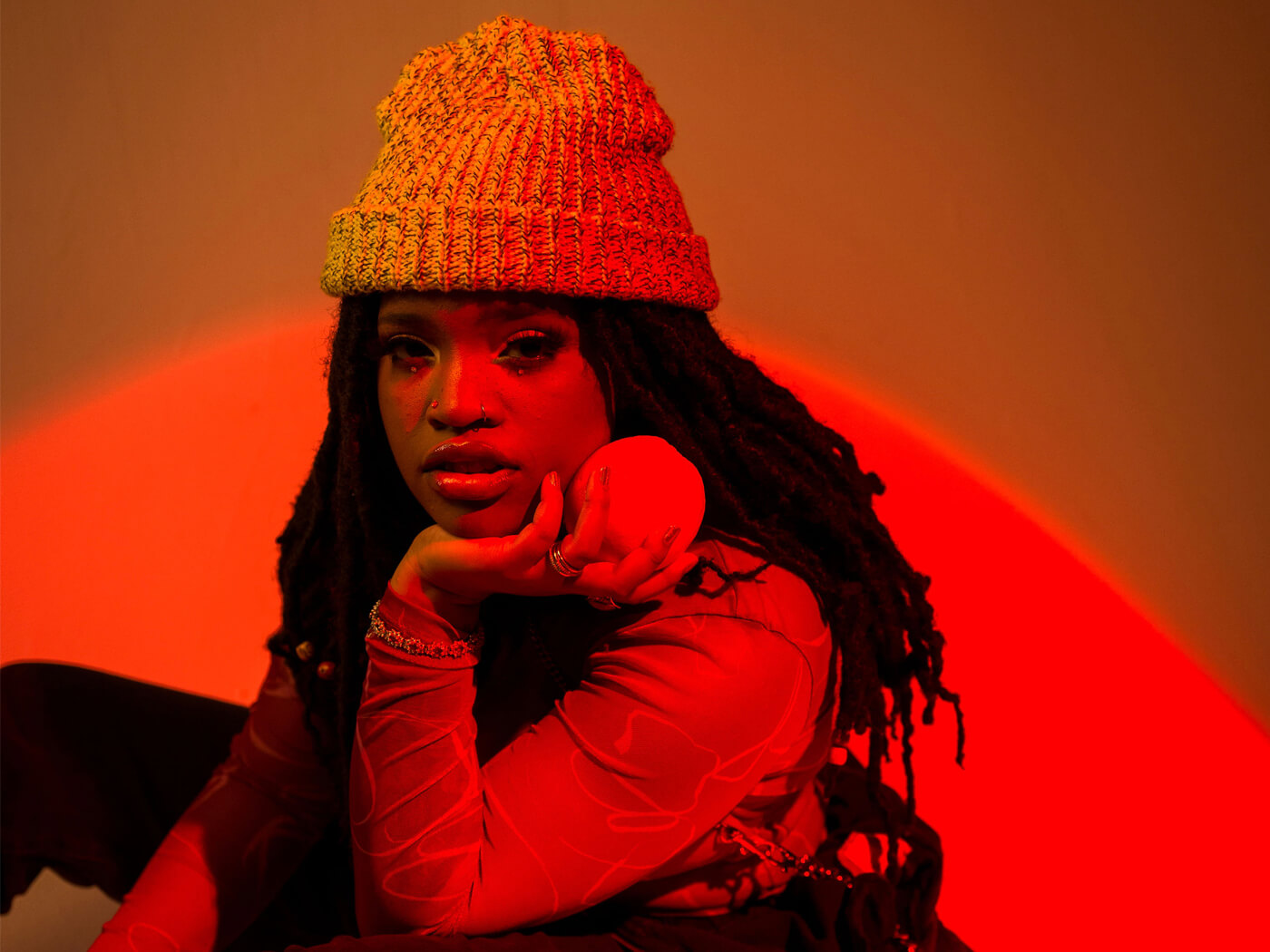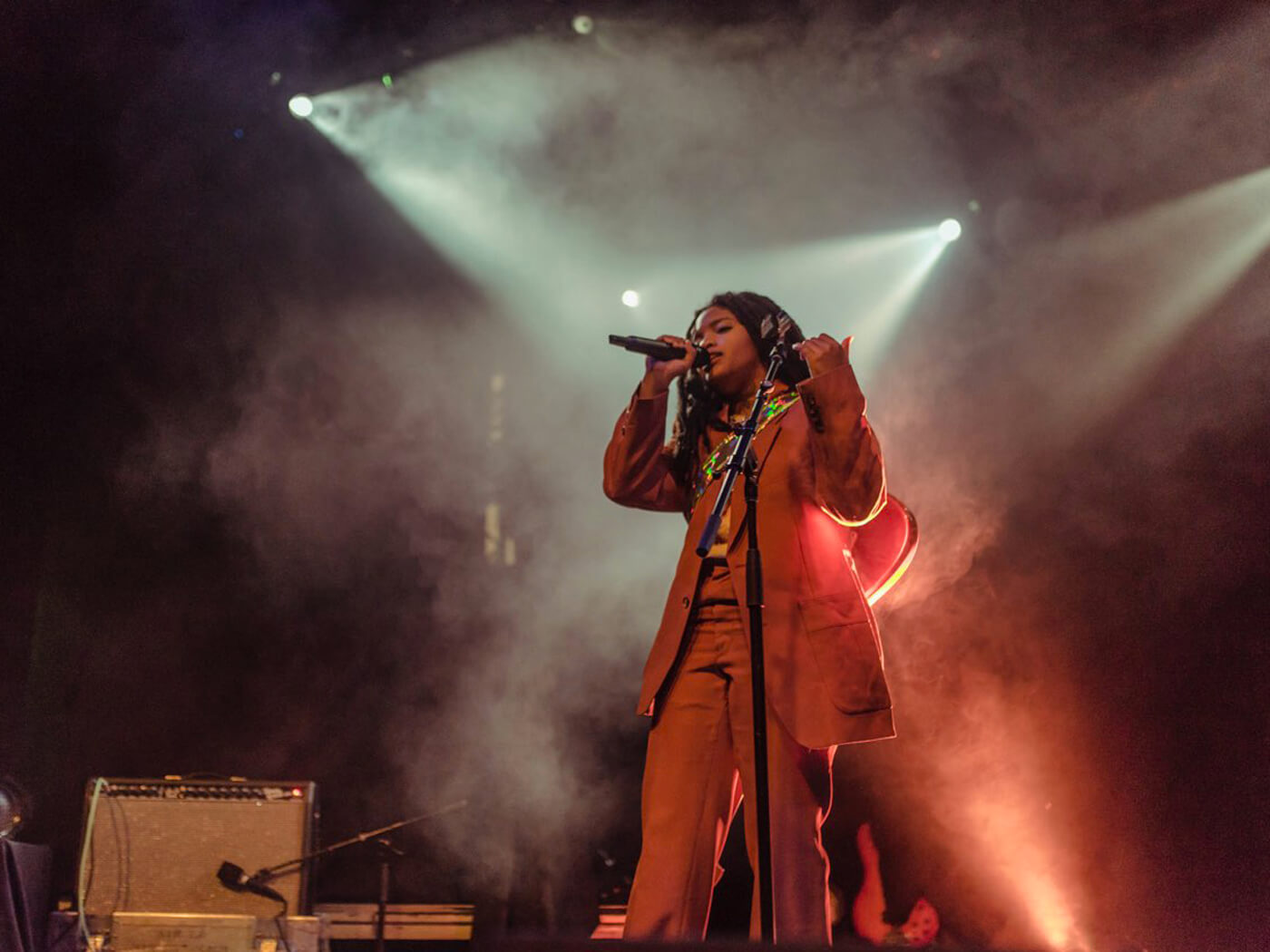Related Tags
“I want to get closer to being great”: R&B artist Ambré talks her new EP and working with H.E.R.
The 23-year-old New Orleans native discusses the process behind her new solo project Pulp and more.

All Images: Press
Ambré’s journey began with a song uploaded to SoundCloud five mere years ago. Now, the 23-year-old New Orleans musician has a Grammy under her belt: she co-wrote two songs on fellow R&B artist H.E.R.’s self-titled album, which was awarded Best R&B Album at the 2019 ceremony. But she’s just getting started.
Ambré is a self-taught musician who learned to play instruments, sing, write, produce, and draw all while growing up in foster care. In 2014, she uploaded her first song to SoundCloud, which racked up over 20,000 plays in the course of a week. This led producer Swagg R’celious (Kirk Franklin, Erykah Badu and Snoop Dogg) to seek Ambré out on Instagram and invite her along to a writing camp for the then-developing artist, Gabriella Wilson (now known as H.E.R.). At the camp, Ambré wrote two singles, U and Changes, which were later selected for H.E.R.’s album.
But for a showcase of Ambré’s own, unadulterated musical vision, look to her first official EP, Pulp, which arrived on Roc Nation in November (it follows two previous projects, Wanderlust and 2090s, which were independently released). The 10-track release tells a psychedelic coming-of-age story with a loose-limbed yet lucid approach to early 00’s R&B. The guitar figures prominently on Pulp, though its presence morps from song to song: Ambré conjures woozy, ethereal textures on Free Drugs, indulges in bluesy twangs on Band Practice, and fingerpicks on Lost. It’s this versatility that allows Pulp to stretch far beyond the constraints of mainstream R&B.
Read on for Guitar.com’s conversation with Ambré about her process, her goals as a guitarist and the effects she used on Pulp.
Do you remember the moment you wanted to learn to play guitar?
I used to watch a lot of John Mayer concerts on YouTube when I was in high school and I was just like ‘Damn, he’s so good, I want to learn how to do that!’ I would slow down his concerts and just practise a certain part and then I would move to the next part. Basically, it was a lot of YouTube videos and trying to train my ear. I used to play trombone when I was in middle school but yeah, that’s about it. I was trying to teach myself piano for a little while before, so I know a few chords, but I wouldn’t say I play piano. I think playing those did help with the guitar a little bit. I ended up gravitating more towards the guitar because it felt good and natural in me.
What model did you start with?
I don’t even remember the name of it, but it was a really cheap electric guitar. It was a short scale guitar and it didn’t sound that great, but once I started to get it to sound kind of good, I was like ‘Ok! This is doing something!’ And then I moved to a Strat.
And is that what you use now?
Yeah. I have a Strat and a PRS custom series. They just feel good. The Strat, for me, I feel very comfortable playing it. I like the tone of it for my style of music and the PRS, as well, plays really smooth.

You’ve started using tapping – what drew you to that technique?
I’ve been trying to get into it now, so I’ve been practising that lately. I saw this guy Stanley Jordan doing a cover of Eleanor Rigby and thought ‘That’s tight as hell, this is dope, this is weird’. It was such a cool sound but I’m trying to figure out my sound, guitar-wise. Like, what’s going to be my staple?
Do you see the guitar as your primary instrument or more of a soundbed?
I see it as my primary instrument, for now. I think I want to explore music in general, I don’t want to limit myself. It could be the soundbed to something new but right now, it’s definitely my primary instrument.
https://www.instagram.com/p/B3W7nHMFmrA/
What’s your set up like?
I use a Fender Strat. I usually record in Ableton and for my effects, I just use the standard stock Ableton plug-ins for reverb. Then there’s the Wav plug-ins with GTR, they have a lot of cool plug-ins and it sounds pretty close to actual analogue guitar effects. I use mostly wah-wah and a little bit of distortion just to give it a little crispness. When I’m on stage, I have a multi-effect pedal, the Boss ME50. I just play around with it, honestly, I just try to make something cool.
Tell me about the effects used on your Pulp EP.
So for my song Band Practice, when I was writing it, I thought it would be cool to have some kind of time change, so I recorded my guitar into Ableton and then halfway through, I slowed it down but gradually… It wasn’t a quick change. And then I used my guitar to make it sound like strings. So I just played around with it. It sounded more like synth than strings but that’s what I was going for.
I recorded both the guitar and bass for it in Ableton through a mini Focusrite, with no analogue effect on it. Then I added some stock compression from Ableton which I just played around with until it felt right. Then a little bit of plate reverb (from Soundtoys) then wah-wah on the licks. Nothing super special, but I think it’s all about how you mix it. Also, I used the Waves GTR3 plug-in for a digital amp, distortion and the pitcher. I pitched some parts about 6 db up and then some 12 down. I also like to play around with my voice a lot, pitching it up and pitching it down. That’s something I’ve been experimenting with lately.
There’s a lot of different sonic aspects to the guitar throughout the EP. Was it important to you to create a release that had all these sounds?
I wanted to make something that was cohesive and felt like it was in the same world, but didn’t sound the same on every song. And I also wanted to let people know this is where I’m going with my music, this is the way that I want people to hear me.
How did you approach these songs?
I didn’t think about it too much in the beginning. I was just trying to make good songs and I was trying to have fun and challenge myself and do something different. Going into it, I really was just like making mad songs and every few months, I would tweak it a little bit, change one part and make it sound a little bit different so it’s not just verse-hook-verse-hook.
Is it important to you to self-produce?
Yeah, but I don’t do it just to say I produced the song. I just want to make good music, so if I don’t have anything to contribute production-wise one day, then I’ll stand back. I just want to have ideas and not force myself to do it.
Did you record this EP at home?
Some of it and then I re-cut it at a better studio because I’m not that great at recording myself. Band Practice, I definitely recorded initially at home and we still kept some of the old vocals. That’s why you hear popping in the background on a few parts, but it’s cool, that’s why I kept it.
Can you tell me about your work with H.E.R. (Gabriella Wilson)?
I met Gabi through this producer named RC Williams. He found me on Instagram and he heard my songs and he told me he was working with Gabi and he wanted me to send him some stuff. I sent him some demos and she liked it and she cut one of them and then her manager flew me out to New York City to work on her debut project… When I went out there, we just vibed and we made a bunch of cool songs. We used Pro Tools to record vocals and there was an engineer running everything in the session – Miki Rother. There were already some tracks made that we picked from to write to and we just wrote lyrics on our phones and used the voice memo app to remember melody ideas.
She was also one of the people that really encouraged me to start taking guitar seriously too, because she’s such an amazing musician and she was helping me out during that time with chords and stuff. She could really sing and she could really play, and we really made some cool stuff so I wanted to keep doing it.
https://twitter.com/ambre/status/1180599314474647555
You’ve collaborated with a lot of different artists, do you think that that has helped to shape your relationship with the guitar?
Definitely, it made me realise how much of a tool guitar is for songwriting. I could be writing a song to a track and then I strip it down on guitar and it just feels completely different and it helps me see it in a totally different way that I didn’t have before.
Where do you see your relationship with the guitar going?
I want to get better at solo-ing, I just want to lock in more. I want to really be a great guitarist, I don’t just want to play guitar. I want to get closer to being great.
What do you hope that Pulp says about Ambré, the solo artist, rather than Ambré, the collaborator?
I hope it says that I spent a very long time on it and I hope it just shows my heart and how much I actually care about the music and about having something to say. I hope people feel it and I hope it says that I’m going to be here for a long time.
Pulp is out now on Roc Nation.
